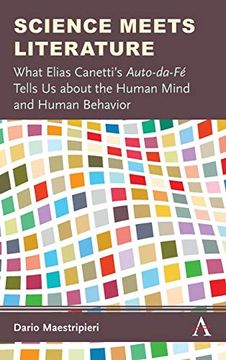Science Meets Literature: What Elias Canetti's Auto-Da-Fé Tells us About the Human Mind and Human Behavior (en Inglés)
Reseña del libro "Science Meets Literature: What Elias Canetti's Auto-Da-Fé Tells us About the Human Mind and Human Behavior (en Inglés)"
"Science Meets Literature" analyzes and discusses Elias Canetti's 1935 novel "Auto-da-Fé" (original German title, "Die Blendung") as an example of the way in which literature can contribute to the scientific understanding of the human mind and human behavior. A growing number of scholars promoting "consilience" have argued that the humanities and the sciences can enhance one another and should not be considered separate domains of knowledge. Consistent with this view, Dario Maestripieri contends that literary fiction can be a source of ideas leading to the formulation of scientific theories and hypotheses about human nature.Elias Canetti's novel "Auto-da-Fé" has traditionally been difficult to interpret and his intentions in writing it have remained unclear. Arguing that "Auto-da-Fé" is a novel about human nature that illustrates the workings of the human mind and some universal aspects of human behavior and human social relationships, Maestripieri supports his interpretation through a careful analysis of Canetti's autobiography as well as with a detailed textual analysis.Maestripieri also maintains that the view of human nature presented by Canetti in the novel is essentially Darwinian and fully consistent with modern evolutionary views of the human mind and human behavior. He then shows that Canetti's insights into the human mind, behavior and social relationships anticipated the scientific discoveries made by cognitive, social and evolutionary psychology beginning in the 1960s and up to the present day (and some of Canetti's ideas have not yet been scientifically tested). Some of these insights and discoveries include the existence of "irrational" biases in human cognition (e.g., in perception, beliefs and decision-making); the strengths and limitations of human "theory-of-mind" skills (i.e., our ability to think about other people's minds and "read" them); the establishment, maintenance and reversal of dominance in social relationships between two individuals (and how dominance is supported by perceptions, beliefs, emotions, motivation and behavior); and the role of dehumanization in harmful behavior.Maestripieri holds that Canetti wrote "Auto-da-Fé" to illustrate the power of human nature and the potentially harmful consequences of power dynamics in human relationships. Canetti also intended to warn against the conviction held by some intellectuals that human nature can be denied, controlled, ignored or dismissed. He was persuaded that a writer has an important responsibility in producing and sharing knowledge of human nature, warn people of the potential dangers of the dark side of human nature and help humankind improve itself. Maestripieri examines Canetti's use of particular narrative strategies in "Auto-da-Fé" because they are intimately linked to the goals the latter intended to accomplish with the novel as well as to his convictions about the biases of the human mind and the role of power in human relationships.Finally, Maestripieri discusses Canetti's approach in "Auto-da-Fé" as an original attempt at the integration of knowledge formation in sciences and humanities, which is generally not addressed in discussions of consilience, and also as an original expression of evolutionary ideas through literary fiction, which is generally not recognized in the field of literary Darwinism. He states that Canetti pointed the way for future successful attempts at the integration of evolution, cognitive science and literature, as well as for the broader integration of sciences and humanities.

